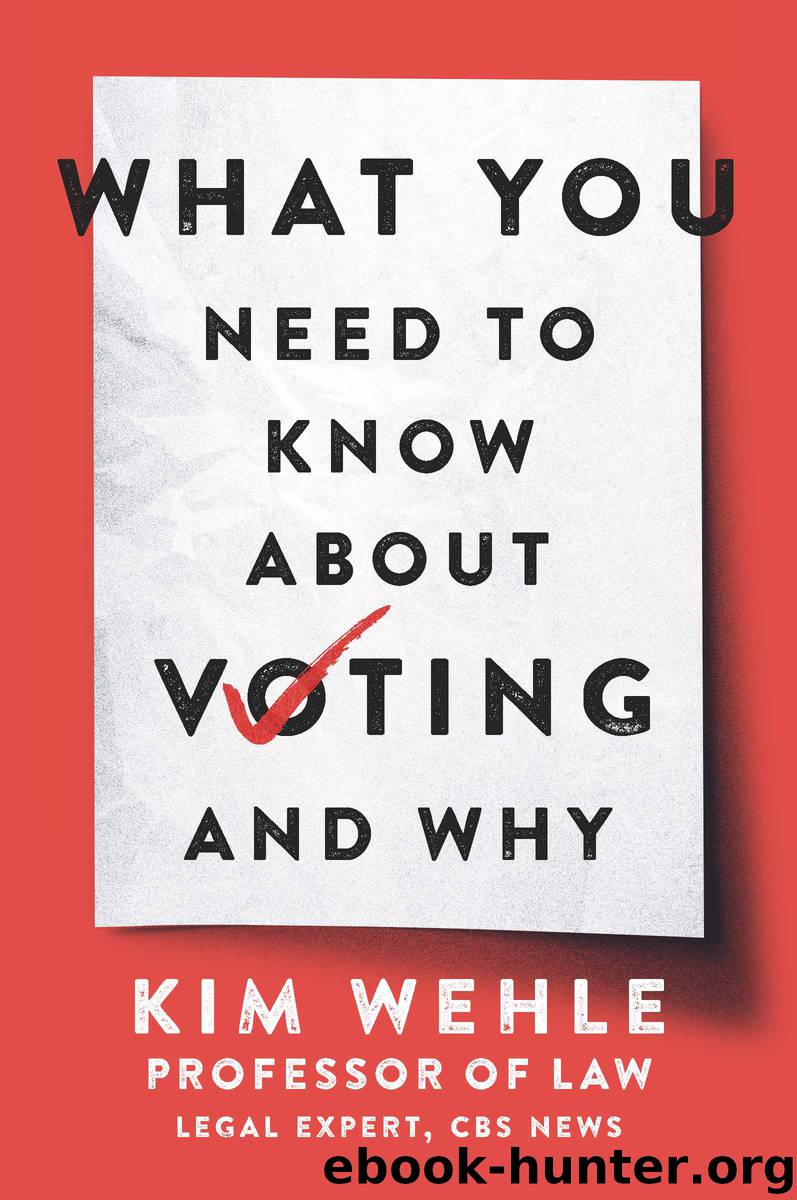What You Need to Know About Voting—and Why by Kim Wehle

Author:Kim Wehle
Language: eng
Format: epub
Publisher: HarperCollins
Published: 2020-04-22T00:00:00+00:00
Term Limits for Congress
Now for a few words about term limits for members of Congress—or the lack thereof. Unlike for the president, who can only serve two terms in office under the Twenty-Second Amendment to the Constitution, there are no term limits for members of Congress in the Constitution. Senators can serve what amounts to a lifetime of six-year terms, and House members can serve a lifetime of two-year terms. The late Democratic senator Robert C. Byrd served West Virginia in Congress for over fifty-one years, and John Dingell Jr.—another Democrat—served sixty years in the House. Nearly every Congress since 1943 has attempted to impose term limits on itself, and nearly three-quarters of likely voters favor such a measure, but none has succeeded.
Why are term limits such a big issue? It’s no secret that members of Congress increasingly spend their time “dialing for dollars” rather than actually proposing and enacting legislation that would benefit the voting public. If they knew their time in office was limited, members would be more willing to take political risks for the sake of their voters. If politicians aren’t constantly worried about raising money and making donors happy, they will focus on what really should matter: voters. New faces in Congress also mean new ideas, while incumbent politicians may be habitually reelected even if they are no longer the best qualified for office. Overall, the argument goes, term limits on Congress could make Congress more effective at lawmaking and more legitimate in the eyes of the American public. If members are focused more on individual voters’ needs and desires and less on deep-pocket donors, every American’s vote—and the right to vote itself—is enhanced. So long as members of Congress are focused on dollar signs to extend their own careers in office, we will not achieve democracy by “We the People.”
The arguments on the other side are also formidable. Those who oppose term limits point out that voters reelect their members every two or six years, depending on whether a race is in the House or in the Senate. To deny them their preferred candidate—even if that person has been in office for numerous terms—is to marginalize their vote, not enhance it. Moreover, legislating and navigating the halls of Congress is a skill that requires experience and expertise. Arbitrarily forcing people out of office to be replaced by newbies with no knowledge of how Congress works could backfire. Finally, some argue that term limits would make members of Congress more—not less—susceptible to wealthy and powerful donors. With more experienced members out the door, the best source of expertise for new members of Congress will be long-standing lobbyists, many of whom are former members themselves.7
Because the American experiment has never included term limits for Congress, it’s impossible to predict whether they would help or harm the integrity of American democracy. It’s hard to dispute, however, that the current system isn’t working well for regular voters.
Download
What You Need to Know About Voting—and Why by Kim Wehle.epub
This site does not store any files on its server. We only index and link to content provided by other sites. Please contact the content providers to delete copyright contents if any and email us, we'll remove relevant links or contents immediately.
The Secret History by Donna Tartt(19023)
The Social Justice Warrior Handbook by Lisa De Pasquale(12182)
Thirteen Reasons Why by Jay Asher(8882)
This Is How You Lose Her by Junot Diaz(6869)
Weapons of Math Destruction by Cathy O'Neil(6260)
Zero to One by Peter Thiel(5782)
Beartown by Fredrik Backman(5729)
The Myth of the Strong Leader by Archie Brown(5491)
The Fire Next Time by James Baldwin(5422)
How Democracies Die by Steven Levitsky & Daniel Ziblatt(5209)
Promise Me, Dad by Joe Biden(5139)
Stone's Rules by Roger Stone(5078)
A Higher Loyalty: Truth, Lies, and Leadership by James Comey(4945)
100 Deadly Skills by Clint Emerson(4910)
Rise and Kill First by Ronen Bergman(4772)
Secrecy World by Jake Bernstein(4736)
The David Icke Guide to the Global Conspiracy (and how to end it) by David Icke(4696)
The Farm by Tom Rob Smith(4500)
The Doomsday Machine by Daniel Ellsberg(4480)
